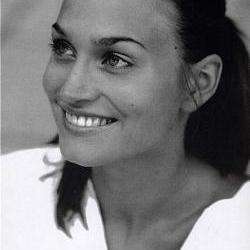Donizetti’s comic opera La Fille du Régiment closed out the 2008 season of the Metropolitan opera with a bang and a whistle. The quirky design by Laurent Pelly and vivid musical direction of Marco Armiliato amid brilliant comic and musical performances from Nathalie Dessay, Juan Diego Flórez, Felicity Palmer, Alessandro Corbelli and Marian Seldes mesmerized audiences around the world and made this production an instant classic.
Nathalie Dessay is irresistible in her feisty, adorable portrayal of Marie, an orphan adopted and raised by the French army. With her Pippi-Longstocking plait, wide-eyed innocence and constant need to be in furious motion, she is a tiny force of nature throughout the evening. Whether ironing, folding and treating laundry throughout “Au bruit de la guerre”, or dragging a clothes-line of shirts melodramatically across the stage during “Il faut partir”, Ms Dessay is absolutely charming and technically unstoppable. She whips through coloratura, then turns around and sings a haunting cadenza without batting an eyelash and all while she completely reflects her character. “C’en est donc fait” is sung from the ground upon which she has thrown herself dramatically, and as ridiculous as the entire plot is, we completely buy into her pain, her relationship with her “papas”, and her instant love for Tonio (Juan Diego Flórez).
Mr Flórez is no less impressive. His indelible performance of “Ah mes amis... Pour mon âme” with its nine high Cs is already legendary among audiences from La Scala to New York. His high notes ring out effortlessly, sweeping through the hall with a grace and power that make the hair stand up on your neck. His lyrical aria “Pour me rapprocher” in the second act is equally impressive, though considerably less showy. His chemistry with Ms Dessay is wonderful; from his entrance in the first act in Lederhosen and a sweater-vest to his dramatic entrance in the second (spoiler alert – he’s riding a tank), he is the picture of a perfect Tyrolian love interest: wide-eyed, dark-haired, heroic and passionately in love with Marie at first sight.
Alessandro Corbelli is a charming, pear-shaped Sergeant Sulpice (Marie’s papa préferé), and his care for his wayward Marie is complemented by Donald Maxwell (Hortensius)’s vigilance vis-à-vis the irascible Marquise of Birkenfeld (Felicity Palmer). Palmer’s “Pour une femme de mon nom” is brilliantly funny, as are her various scenes with Maxwell and Corbelli. A cameo by award-winning Marian Seldes as the cantankerous Duchess of Krakenthorp rounds out the cast strongly.
Laurent Pelly’s diverting production features towering Tyrolean mountains, constructed out of actual maps of Europe, which provide the backdrop for the action. The soldiers preparing to fight in the opening scene brandish pitchforks and rakes and wear pots and bowls on their head. Their barricade is furniture, mattresses and wagons. The French camp is strung with mens’ long underwear, letting us know from the beginning that there is really nothing to worry about. Marie’s new home in the second act includes a raised floor under which her treasures and huge roles of papers are stored; open picture frames are filled by her military “papas” as they save her from an arranged marriage.
This Donizetti masterpiece, although initially panned by Berlioz after an difficult première at the Opéra-Comique in Paris and poorly received in its La Scala opening in 1840, has become a benchmark for comic opera. As in all comedy, the magic is in the execution. This production’s musicianship, technique, ingenuity and split-your-sides comic magic ensure that it will remain in the repertoire for decades to come.


